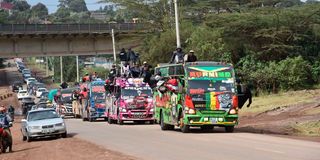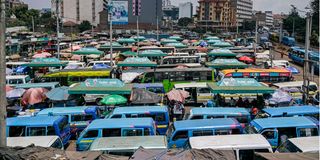
Mr Joseph Gikonyo a matatu owner operating on the Nyeri Nairobi (Nyena) Sacco route.
| Mwangi Muiruri /Nation Media GroupMuranga
Premium
‘My year of pain running matatu at 75pc less profit’
It has been a year of pain for the matatu sector under President William Ruto's presidency. Mataatu operators claim the profit margins have dropped by 75 per cent.
According to Mr Ngugi Ngigi, who plies the Nairobi-Murang'a road, the slump in profitability is a result of high fuel prices.
He said two days after President Ruto was sworn in, the pump price of petrol jumped from Sh140 to Sh165. It was then increased by another Sh20 in the Finance Act 2023.

Matatu drivers and touts protesting against the introduction of Super Metro buses on the Ngong-Nairobi route on Ngong Road on February 10, 2021.
"We have also been hit by increased licence fees, high spare parts prices, police roadblocks that eat into our incomes as well as routine arrests and court fines," he said.
Mr Ngugi said the drop in purchasing power among Kenyans has seen many abandon unnecessary travel.
"While in the previous regime, we used to get contracts to transport people to social functions like funerals, weddings, dowry payments and retreats, now people opt to send small delegations that can be transported by motorcycles, bicycles and Tuk-tuks," he said.

A student rides a boda-boda in Eldoret town, Uasin Gishu County, on his way to school on August 29, 2023.
He said the Hustler Nation policy, manifested in the bottom-up economic model, has seen the matatu sector face stiffer competition as other modes of road transport are flooded by low-income investors.
"Private car owners are infiltrating public transport in large numbers in the name of empowering the bottom of the pyramid. It is a good thing to broaden the income bracket, but we also need regulations," he said.
Mr Joseph Gikonyo, another matatu operator, has been in the business for 18 years.
"I am currently in the business through Nyena Sacco and the problems we are experiencing are eroding profits. The once-lucrative business has now been reduced to that of probabilities. You can make a profit and you can make a loss. On average, profits have fallen by 75 per cent," he said.
He said the cost of buying a new public service vehicle of any capacity has gone up by about 40 per cent. For example, a 14-seater used to cost us Sh2.7 million but now it has gone up to Sh3.2 million.

Matatus queue to transport passengers in Nairobi on September 12, 2023.
He said as soon as the economy stabilises, the government should consider reducing taxes to give investors a chance to make profit.
"We are having a hard time and it is a big challenge. Government policies have raised the cost of operation.
Mr Gikonyo said: "So far we have defaulted on loan repayments. Financial institutions have not revised interest rates downwards to reflect dwindling profits.
Mr Ngugi urged President Ruto's administration to find a solution to the high cost of critical drivers of the economy such as fuel and electricity.
He also urged the National Police Service to advise traffic policemen to desist from taking bribes and arbitrarily arresting matatu drivers.
Mr Gikonyo said the government should engage in dialogue with industry players to come up with win-win formulae that will not kill the sector.
"We understand that the government is in dire need of taxes to run its programmes. We have no problem with being taxed but it should be done in a manner that does not take our profits away," he said.





